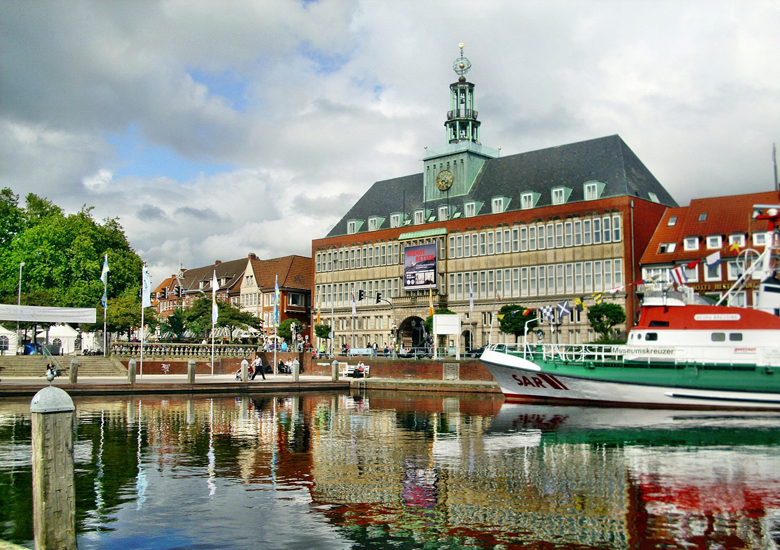Emden is a city in Lower Saxony, a state in Germany.
History : The exact founding date of Emden is unknown, but it has existed at least since the 8th century. Older names for Emden are Amuthon, Embda, Emda, and Embden. Town privilege and the town’s coat of arms, the Engelke up de Muer (The Little Angel on the Wall) was granted by Emperor Maximilian I in 1495.
In the 16th century, Emden briefly became an important centre for the Protestant Reformation under the rule of Countess Anna von Oldenburg who was determined to find a religious “third way” between Lutheranism and Catholicism. In 1542 she invited the Polish noble John Laski (or Joahannes a Lasco) to become pastor of a Protestant church at Emden and for 7 years he continued to spread the new religion around the area of East Frisia. However, in 1549 following pressure from the Emperor Charles V, the Countess was forced to ask Laski to leave for England and the experiment came to an end. Nevertheless, the legacy was important for the reformation in the Netherlands.
Emden was a very rich city during the 17th century, due to large numbers of Dutch immigrants such as Diederik Jansz. Graeff. It was a centre of reformed Protestantism at that time, producing the first Bible translation in Dutch. The Emden Revolution in 1595 resulted in Emden becoming a distinct city-state. The political theorist Johannes Althusius served as Syndic from 1604 to 1638.
In 1744 Emden was annexed by Prussia. In 1752 Frederick the Great chartered the Emden Company to trade with Canton, but the company was ruined when Emden was captured by French forces in 1757 during the Seven Years’ War. The city was recaptured by Anglo-German forces in 1758 and for the rest of the conflict was used as a major supply base by the British to support the ongoing war in Westphalia. During the Napoleonic French era, Emden and the surrounding lands of East Frisia were part of the short-lived Kingdom of Holland.
Industrialization started at around 1870, with a paper mill and a somewhat bigger shipyard. At the end of the 19th century, a big canal, the Dortmund-Ems Canal was constructed, which connected Emden with the Ruhr area. This made Emden the “seaport of the Ruhr area”, which lasted until the 1970s. Coal from the south was transported to the North Sea port, and imported iron ore was shipped via the canal towards Rhine and the Ruhr. The last iron ore freighter was moored in the port of Emden in 1986.
In 1903, a large shipyard (Nordseewerke, “North Sea Works”) was founded which still exists today.
The city centre was almost completely wiped out as a result of Allied bombing raids during the Second World War, destroying nearly all historic buildings. The RAF first bombed Emden on 31 March 1940. The most severe bombing took place on 6 September 1944, when roughly 80 percent of all houses in the city centre were destroyed. In the collective memory of the city, this date still plays an important role. The shipyard area was largely untouched – the British targeted the civilian areas, apparently in revenge for the bombing of Coventry by the Luftwaffe. The reconstructed city was opened on 6 September 1962, exactly 18 years after the bombing.
Access : Coordinates: 53.366944, 7.206111 / By train : Emden sees regular hourly train service from Bremen. There is also Inter-City service from further away with direct service to/from Cologne and Leipzig among others. 1 Emden Hauptbahnhof. The main station, for easy access to the city. 2 Bahnhof Emden Aussenhafen. Right next to the harbor where ships for Borkum leave. By car : A31 connects the city to the German Autobahn network.
By plane : 3 Flugpatz Emden (EME IATA). A tiny general aviation airstrip. OFD flies to Borkum. If you are arriving from farther away, Bremen (BRE IATA), Groningen (GRQ IATA) and Amsterdam Schiphol Airport (AMS IATA) are your best bet. By boat : AG EMS runs ferries to Borkum and a couple of other places. The ferry to Borkum is able to carry cars.
Highlights :
- Dat Otto Huus, Große Straße 1, . Shop and museum of the German actor and comedian Otto Waalkes.
Go next : Aurich / Norden Norddeich / Leer / Delfzijl (Netherlands) / Groningen (Netherlands) / Many visitors to Emden only pass through on their way to Borkum, the largest by area of the East Frisian islands

